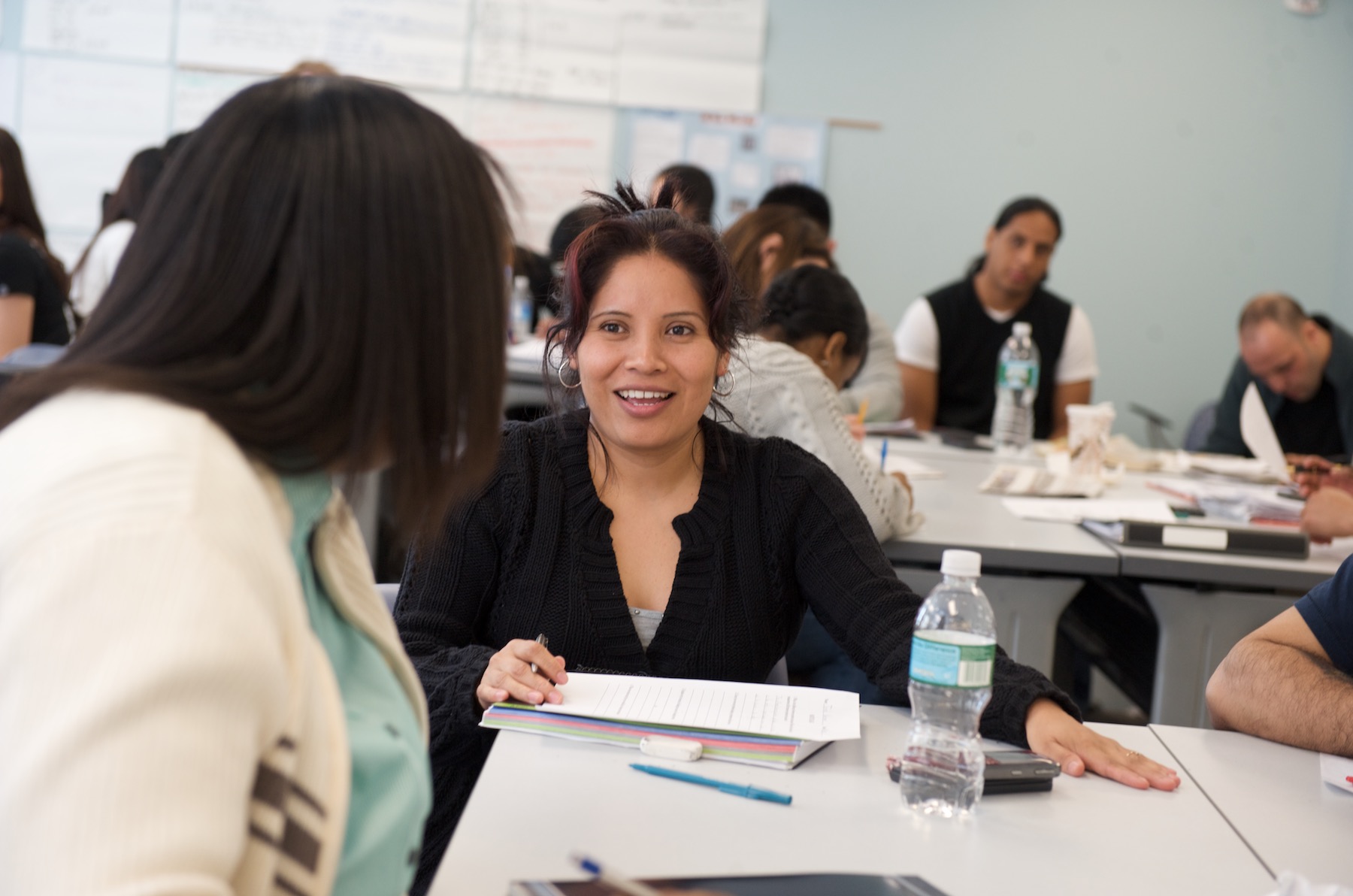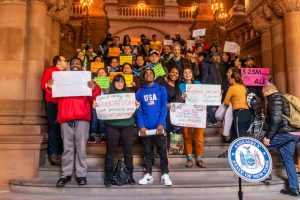
February 27, 2020
The Center for Continuing Education and Workforce Development (CE) at Borough of Manhattan Community College (BMCC/CUNY) has received $1.25 million from the New York State Education Department’s Adult Literacy Education (ALE) program to fund its bridge programs — English for Speakers of Other Languages (ESOL), High School Equivalency (HSE), and Adult Basic Education (ABE) — for another five years.
Students who complete these programs go on to earn associate degrees or enter the workforce with higher skills. For underrepresented or disadvantaged students with low levels of education, the pathway to upward mobility often starts with BMCC’s ALE-funded program.
“Every time I see that BMCC ad on a billboard or brochure — ‘Start here, go anywhere’ — I think, ‘That’s really us,’” says BMCC Director of Adult Basic Education Programs Denise Deagan. “Nowhere is that slogan more apt than in the literacy program of Continuing Education. Adult students come to us to start the most fundamental education in reading, writing and math. Against daunting odds, so many of them persist to make the most of a second chance to build the lives they want for themselves and their families.”
Literacy is job training
College-ready literacy, Deagan explains, “is not accomplished overnight, so I am especially pleased that our program is again the recipient of New York State ALE funding because for 12 years that funding stream has supported the direct literacy services students need to reach post-secondary success.”
In the current funding environment, she says, “where federal grants are increasingly only available for narrowly conceived, and quick turnover job training, ALE continues to be a welcome harbor in a political storm. ‘Literacy is job training,’ we say. And in combination with our Settlement House partners of the Literacy Zones, ALE funding helps BMCC build bridges to communities most in need of the educational services we provide.”
While this funding supports students at a range of levels, Tatiana Ades, the ALE case manager, emphasizes the importance of the ALE focus on the lowest literacy levels: “ I am most proud of our students who begin their educational journey at the lowest literacy level. Despite the many barriers they face, they persist and achieve amazing progress.”
Mamadou (Misbaou) Bah, now earning a 3.89 GPA as he completes an associate degree in engineering science at BMCC, is a striking example of the pathway to an education that ALE-funded programs make possible.
Bah moved to New York from Guinea, with French as his first language. “I knew English grammar but I couldn’t have a conversation in English. I didn’t know how to write in English. I learned all of that in Continuing Ed at BMCC,” he says.
Once his English skills were strong enough, Bah took the High School Equivalency class at CE, passed the equivalency exam and matriculated into the associate degree program at BMCC.
“The ALE program helped me be where I am today,” Bah says. “I come from a developing country and these programs opened my eyes to what the educational system offers.”
He adds that as an immigrant with ‘pending asylum’ status, he didn’t qualify for financial aid — but received a full scholarship for his associate degree program at BMCC through Within Reach, a non-profit that serves adult learners seeking higher education at CUNY and was founded by Jane Tarica, a BMCC adult education instructor.
“I want to work in civil engineering and focus on building houses,” Bah says. “I have an uncle back home who was a civil engineer. After my dad died, my uncle was there for me. He passed away in 2012, and that pushed me to move to New York and finish what he was trying to do for me. We never know what might happen.”
Students advocate in Albany for their ALE Program at BMCC
 Another student who feels strongly about the importance of ALE-funded classes at BMCC is Toni Holston. In February 2020, she joined four other CE students — as well as case manager Tatiana Ades and reading and writing instructor Malcolm Hansen — to lobby state legislators in Albany.
Another student who feels strongly about the importance of ALE-funded classes at BMCC is Toni Holston. In February 2020, she joined four other CE students — as well as case manager Tatiana Ades and reading and writing instructor Malcolm Hansen — to lobby state legislators in Albany.
The BMCC contingent traveled in a charter bus, leaving New York City at about six in the morning and returning to Manhattan by 6 p.m. the same day. In Albany, they joined more than 50 students from CUNY and community-based organizations across New York state, meeting in person with state legislators to impress upon them, the value of ALE funding and its impact on their lives.
“As an African American woman in my 40s, divorced with two children, I have found BMCC’s adult education program to be significant and valuable,” says Holston. “I’ve had the pleasure of meeting other people like myself, who for whatever reasons didn’t get their high school diplomas, but wanted to work towards their diplomas and go to college.”
Holston, who grew up in Brooklyn, came to BMCC after years working as a corporate administrative assistant where she realized, “working with kids is my passion and potentially I would like to work with children with special needs.”
To make that happen, she has taken HSE classes, Math Start and college prep classes through BMCC’s continuing education program. She is on track to earn the high school equivalency diploma, then enter the early childhood education associate degree program at BMCC.
“BMCC’s adult education program has given me the confidence and motivation to continue my education,” Holston says. “Unfortunately, not everyone has access to free high school equivalency programs with college preparation which is why funding is so necessary.”
Bridge programs close the education gap for wide range of students
Another CE student (who does not want to share her name publicly) came to New York from Algeria in 2019 and is now attending an ALE-funded, English for Speakers of Other Languages (ESOL) Bridge class.
“I studied English terminology specific to biology, before I came to New York,” she says. “I need to improve my English to reach my goal to study nursing or to enter the pharmacy tech industry.”
Her classmate, who asked to be identified by her first name, Fatima, moved to New York from Morocco in 2019.
“I used to be a child psychiatrist,” she says. “I can’t practice medicine here and I don’t have time to start all over with my education, starting with the high school equivalency, so I am looking to improve my English and find a job in some organization like the UN or a place where they accept other country’s degrees.”
Tong Hong, from the same class, moved to New York from China in 2014. “I had a bachelor’s degree and a business, my own early childhood center,” she says. “I want better English so I can go to college and study education for children.”
ABE/ESOL/HSE Instructor Lester Lambert explains the complex range of students that attend the Bridge program.
In any given class, he says, he could be working with students who did not finish high school in their country of origin, as well as those who completed high school before coming to the United States but cannot access their academic documents. Still others have completed college abroad and were professionals in their birth countries.
Hui Zhen (Jane) Xu, a beginning level ESOL students, says she wants to learn English reading and writing so that she can eventually earn an HSE. “I appreciate this free English class and the educational system in the United States,” says Xu.
Moya McLellan, who is Xu’s ESOL instructor, says, “Jane didn’t have formal education in her first language, and yet she has come very far. It’s incredibly important to serve students like Jane who have very entry-level English skills, but are determined to be able to speak English to their young children, to communicate their healthcare needs, to communicate with their children’s teachers and to fully engage in opportunities for themselves and their families in New York City.”
Thanks to the $1.25 million ALE funding, that instruction will continue to be available for at least five more years, preparing students for degree programs, increasing their mobility and opening doors to a better life.
STORY HIGHLIGHTS
- BMCC’s Center for Continuing Education and Workforce Development receives $1.25 million from NY State Education Department’s Adult Literacy Education (ALE) program
- Funding supports Bridge programs — ESOL, HSE, basic education — for another five years
- Students who complete the program enter BMCC as matriculating students, begin careers and raise their economic mobility

